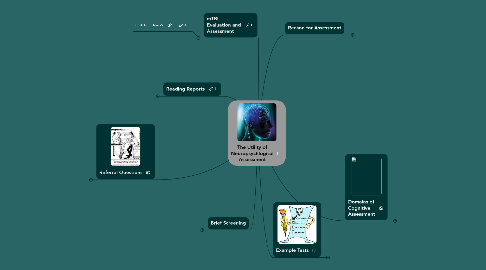
1. Referral Questions
1.1. What Not to Say
1.1.1. Memory Problems
1.1.2. Leave Blank
1.2. Be Specific
1.2.1. CPRS HAS ROOM
1.3. Be Available
2. Reading Reports
2.1. Summary
2.1.1. Overall IQ
2.1.2. Strengths
2.1.3. As Suspected
2.1.4. Weaknessess
2.1.5. Integration with Functionality
2.1.6. Etiology
2.1.7. Formulation
2.2. Recommendations
2.2.1. Specific
2.2.2. Usually Bullet Points
2.2.3. Patient Friendly
3. mTBI Evaluation and Assessment
3.1. Click Icon Here ->
4. Brief Screening
4.1. MOCA
4.2. Cognistat
4.3. Mini Mental
5. Domains of Cognitive Assessment
5.1. GIF
5.1.1. History
5.1.2. Assessment
5.2. Memory
5.2.1. Three Processes
5.2.1.1. Encoding
5.2.1.2. Storage
5.2.1.3. Retrieval
5.2.2. How Information is Presented
5.2.2.1. Contextual
5.2.2.2. Discrete
5.2.3. Types of Memory
5.2.3.1. Immediate
5.2.3.1.1. Verbal
5.2.3.1.2. Visual
5.2.3.2. Delayed
5.2.3.2.1. Verbal
5.2.3.2.2. Visual
5.2.3.3. Recognition
5.3. Executive Functioning
5.3.1. Judgement
5.3.2. Insight
5.3.3. Organization
5.3.4. Initiation
5.3.5. Planning
5.4. Attention/Concentration
5.4.1. Simple Attention
5.4.2. Divided Attention
5.4.3. Mental Flexibility
5.4.4. Set Switching
5.5. Visuospatial Skills
5.5.1. Constructional Ability
5.5.2. Visual Orientation
5.5.3. Spatial Manipulation
5.6. Processing Speed
5.6.1. Processing vs. Motor Functioning
5.7. Language Skills
5.7.1. Confrontational Naming
5.7.2. Semantic Categorical Generation
5.7.3. Phonemic Fluency
6. Reason for Assessment
6.1. General Baseline Testing
6.1.1. Common for Geriatric Pop
6.1.2. Head Injury
6.1.3. Stroke and Other Medical Problems
6.1.4. Substance Abuse Patients
6.2. Follow Up Testing
6.3. Decision Making Capacity
6.3.1. Specific
6.3.2. Functional
6.3.2.1. Collateral Information
6.3.2.2. Real Life Tasks
6.3.3. Neuropsychological
6.3.3.1. Executive Functioning
6.3.3.2. Processing
6.3.3.3. Memory
6.3.3.4. Decision Making Capacity is not the same as implementation
6.4. Differential Diagnosis
6.4.1. Why isnt Anti Dep Working
6.4.1.1. Depression vs. Cog Disorder
6.5. Specific to Referral
6.5.1. ADHD
6.5.2. Dementia
6.5.3. Other
